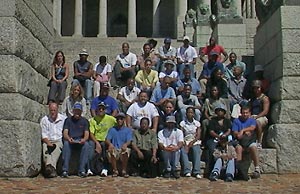|
Environmental Engineering - Sustainable Development in Coastal Areas course kicks off |
16 NAMIBIANS JOIN SOUTH AFRICAN STUDENTS FOR A DISTANCE LEARNING COURSE ON DLIST-BENGUELA
 Once again, the course on Environmental Engineering—Sustainable Development in Coastal Areas, offered by the Cape Peninsula University of Technology (CPUT), has started. Once again, CPUT students are joined by distance learners who enrol through DLIST. This year, most of the distance learners come from Namibia, mainly from the Ministry of Fisheries and Marine Resources but also from the private sector and research institutions. Ten out of the sixteen distance learners were sponsored by the Benguela Current Large Marine Ecosystem (BCLME) Programme, which shares the same target area as DLIST-Benguela—the coastal zone of Angola, Namibia and South Africa. Once again, the course on Environmental Engineering—Sustainable Development in Coastal Areas, offered by the Cape Peninsula University of Technology (CPUT), has started. Once again, CPUT students are joined by distance learners who enrol through DLIST. This year, most of the distance learners come from Namibia, mainly from the Ministry of Fisheries and Marine Resources but also from the private sector and research institutions. Ten out of the sixteen distance learners were sponsored by the Benguela Current Large Marine Ecosystem (BCLME) Programme, which shares the same target area as DLIST-Benguela—the coastal zone of Angola, Namibia and South Africa.
Students are introduced to core environmental concepts, with a focus on the coastal areas of South Africa and Namibia. The course starts with an introduction to the socio-economic and environmental landscapes of this coast, followed by a discussion of governance rules and management tools required for their sustainable development. The remaining modules are dedicated to resources such as water, energy, air and natural living resources, covering aspects relating to their use, depletion or degradation, and protection.
Case studies from the coastal regions of South Africa and Namibia are used, and the exchange of experiences and views between students and environmental/development practitioners is encouraged. During one semester, the students follow the course material (and, in the case of contact students, attend lectures) and complete assignments at the end of each module, as well as a final project at the end of the course.
A revised version of the course was piloted in 2006 and will be offered this year with some further improvements. One such improvement is the addition of an introductory module on information literacy to equip the students with better information search, technical writing and referencing skills that they will need throughout the course.
Both contact and distance students have access to a dynamic pool of information and a network of experts at DLIST to complement their studies. Not only is the course material available to anyone on the DLIST portal in the Online Courses section, but the students can also search for additional documents or photos in the Information Hub. In the Student Discussions, contact students, distance learners and the course coordinator can interact on course related matters, while in the General Discussions they can engage in debates with other interested people on the coast and experts.
Another source of information and support for both contact students and distance learners this year is the Environmental Resource Centre (ERC) at CPUT. Contact students will be able to access environmental journals, reports and DVDs at the ERC Library, as well as to use dedicated computer workstations. Distance learners as well as contact students can access the online Environmental Resource Portal through the CPUT website at http://erc.cput.ac.za, where they will find a video library and the Student Wiki, providing a great starting point for research on a diverse range of environmental topics.
The DLIST Team, together with partner universities in Namibia and Angola, is working to make more courses available to distance learners on DLIST. If you have any suggestions and ideas to use the DLIST portal to further environmental training in Angola, Namibia and South Africa, write to us at admin@dlist-benguela.org.
In the meantime, you can find more information about the CPUT course on www.dlist-benguela.org/About_Online_Courses, where you can also download the course material to learn more about environmental issues.
|